![10 Best Zendesk Competitors in 2024 [Free + Paid]](/content/posts/zendesk-competitor/Denser_AI_example_1.png)
10 Best Zendesk Competitors in 2024 [Free + Paid]

Zendesk has proven beneficial for many businesses. Its comprehensive platform boosts customer support operations with its wide range of features.
However, while Zendesk offers numerous advantages, it might not be the perfect solution for every business, particularly startups or small businesses.
The main issues for these smaller entities are around Zendesk's cost and complexity.
Zendesk can be expensive, which might not be justifiable for businesses needing basic customer support tools. The extensive features that Zendesk offers, while beneficial for larger enterprises, can be overwhelming for smaller businesses that require a simpler approach.
Some users reported that Zendesk's customer support was not as responsive or helpful as needed. This can be problematic during the setup phase or when urgent issues arise, as effective platform support is essential for resolving any challenges.
Given these considerations, these businesses may opt for simpler, cost-effective customer support solutions that are easier to set up and maintain.
Choosing a customer support platform is a huge decision that requires careful consideration of various factors. The right platform should meet your current needs and scale with your business as it grows.
Why Consider Zendesk Competitors?#
Zendesk is a popular customer support tool, but it's not always the best fit for every business.
Each business has unique requirements, and some Zendesk competitors might offer features that are more aligned with specific needs.
A platform that's easy to use can save your team a lot of time and frustration. Some competitors have more intuitive designs, making training new employees and managing customer support easier.
When considering alternatives to Zendesk, ask yourself these questions:
- What essential features are missing in Zendesk that are essential for my operations?
- Do I need advanced ticketing capabilities, extensive multi-channel support, or strong automation and AI tools?
- What is the scale of my customer service operations in terms of both customer count and request volume?
- How does my available budget compare with the cost of Zendesk alternatives?
- Does my business require a platform that offers high levels of customization and the ability to scale as we grow?
What to Look for in Zendesk Competitors#
Different needs, pricing considerations, or feature preferences might lead you to explore other options. Below are the key areas to focus on when evaluating Zendesk competitors.
Multi-Channel Support#
Zendesk's multi-channel support allows businesses to handle customer inquiries through various communication channels, such as email, phone, live chat, social media, and SMS.
This level of multi-channel capability is crucial for businesses that want to provide seamless support across different platforms.
Ticketing System#
A comprehensive ticketing system like Zendesk's is a must for teams managing high customer inquiries.
Competitors should offer ticketing solutions that allow you to track, prioritize, and manage customer issues from start to finish.
Automation and AI-Powered Tools#
Zendesk's automation and AI tools help reduce manual workload by automating responses and providing real-time customer insights.
These tools are especially useful for businesses handling many customer queries.
Knowledge Base and Help Center#
Zendesk's knowledge base allows customers to access self-service resources, reducing the workload on your support agents.
For businesses looking to set up self-service portals, a competitor should offer a similar knowledge base feature that is customizable and easy to navigate.
Reporting and Analytics#
Zendesk's reporting and analytics tools allow businesses to track performance metrics like response times, ticket volumes, and customer satisfaction.
These insights are critical for making informed decisions and optimizing customer support efforts.
When evaluating alternatives, look for reporting features that include customizable dashboards, agent performance tracking, and real-time analytics.
These tools will help you better understand customer needs and improve your support team's efficiency.
Scalability and Flexibility#
As your business grows, so will your customer support needs.
Zendesk is designed to scale with businesses of all sizes, making it an excellent option for enterprises. However, some businesses may find Zendesk's complexity more than they need.
Top 10 Zendesk Competitors#
After determining what you need in a customer support system, you should find a platform that meets those needs.
While Zendesk is a well-known option, many other competitors might better fit your specific requirements.
Here are the top 10 alternatives to Zendesk, each offering unique features that could be just what your business needs.
1. Denser.ai#
Denser is a sophisticated AI platform designed to improve digital customer service, ideal if you're seeking better customer chat support compared to Zendesk.
It uses advanced semantic AI to process customer data and process customer inquiries for human-like interactions.
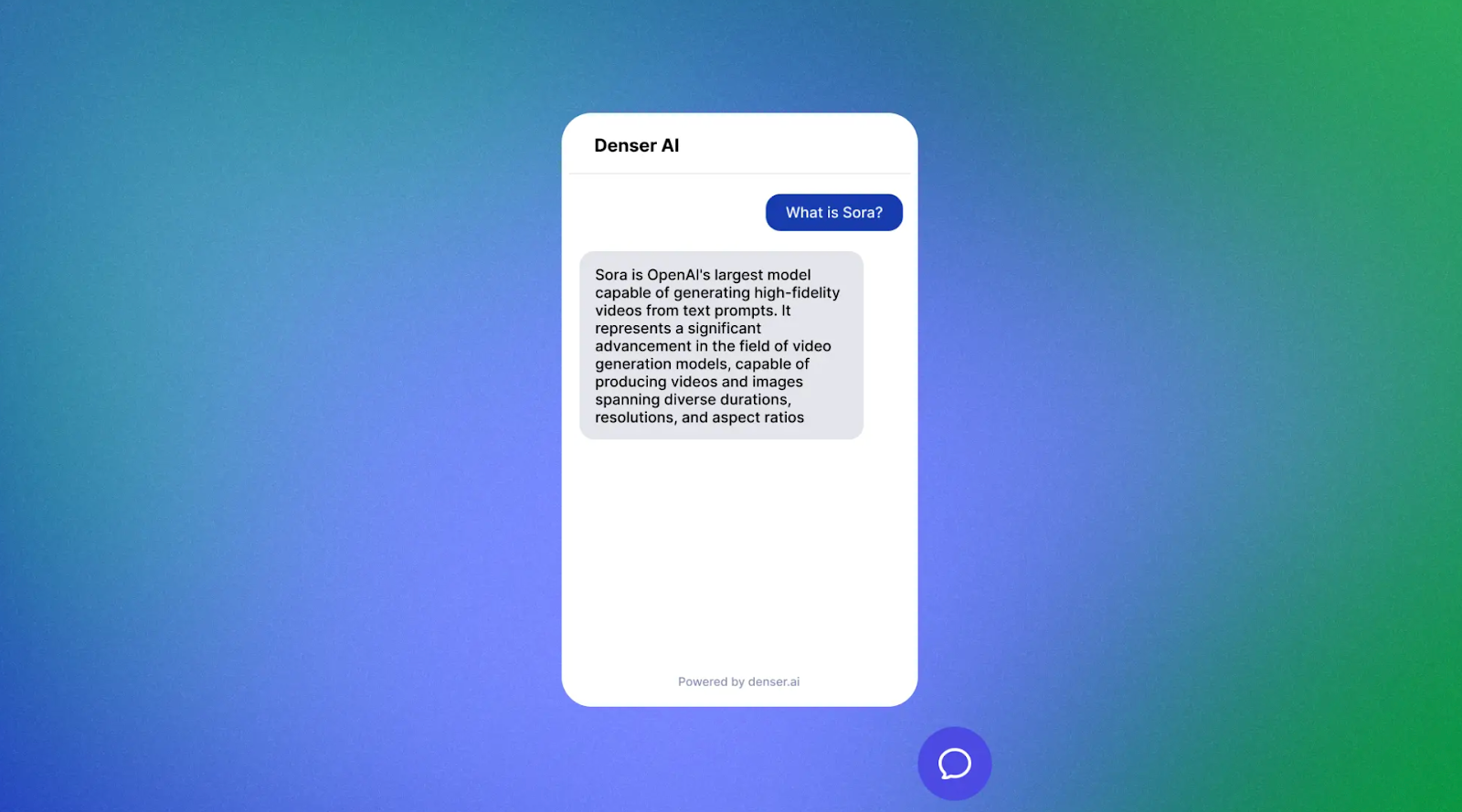
Denser.ai helps you handle customer questions, which helps cut down response times and ensures customers get the answers without delay.
It also provides detailed and accurate responses by linking directly to documents or specific information.
You can customize the way Denser.ai communicates with customers to fit your brand’s voice, which gives a more personal touch to interactions.
As your business grows, Denser.ai can grow with the demands. It easily manages an increasing number of customer queries, handling more complex needs without overwhelming your team.
Denser.ai offers round-the-clock support to ensure customers can get help at any time.
Beyond answering questions, it also helps generate leads by engaging visitors, collecting their information, and guiding them through the sales process.
The platform integrates smoothly with popular tools like Slack, Zapier, and Google Drive for faster setup and keeping your team connected.
With Denser.ai, you get a smarter, more flexible solution for your customer support needs. It’s an ideal option for businesses of all sizes looking to scale their support operations.
Denser Pricing Plans#
This platform also offers more competitive pricing than Zendesk, which is especially beneficial for small businesses that must keep costs down. You get more features for less money, which means more value for your investment.
Denser.ai offers plans for businesses of all sizes:
- The Free Plan includes one bot and 20 queries per month at no cost
- The Starter Plan costs $19/month with two bots and 1,500 queries
- The Standard Plan is $89/month with four bots and 7,500 queries
- The Business Plan costs $799/month with eight bots and 15,000 queries
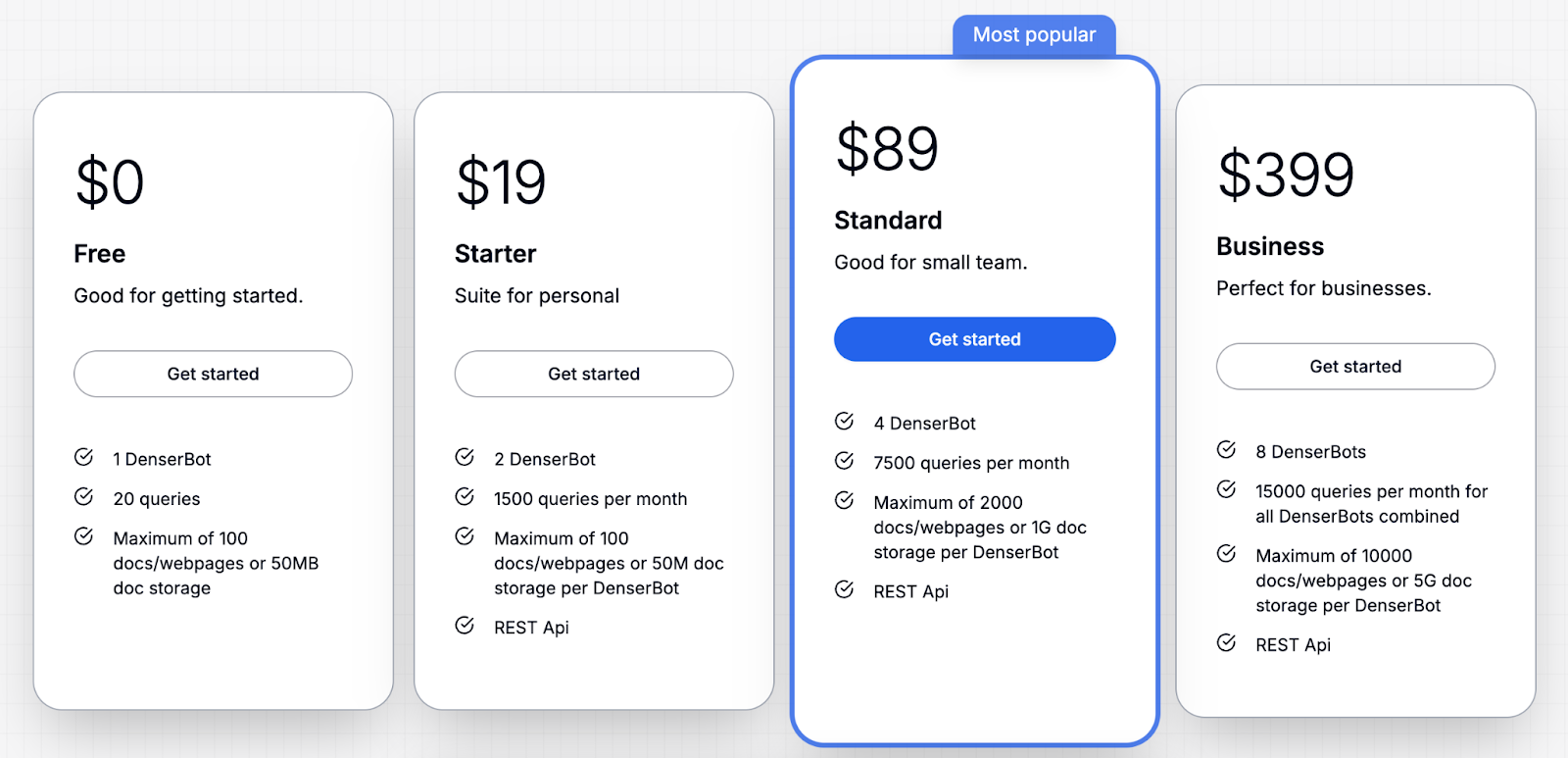
You can also try Denser.ai for free or schedule a demo to see which plan fits your needs.
2. Freshdesk#
Freshdesk is known for its range of helpful features that are designed to boost customer service. It offers an omnichannel help desk that allows agents to manage communications across various platforms.
The platform also emphasizes team collaboration with shared inboxes and discussion forums for quick problem-solving and efficient customer service.
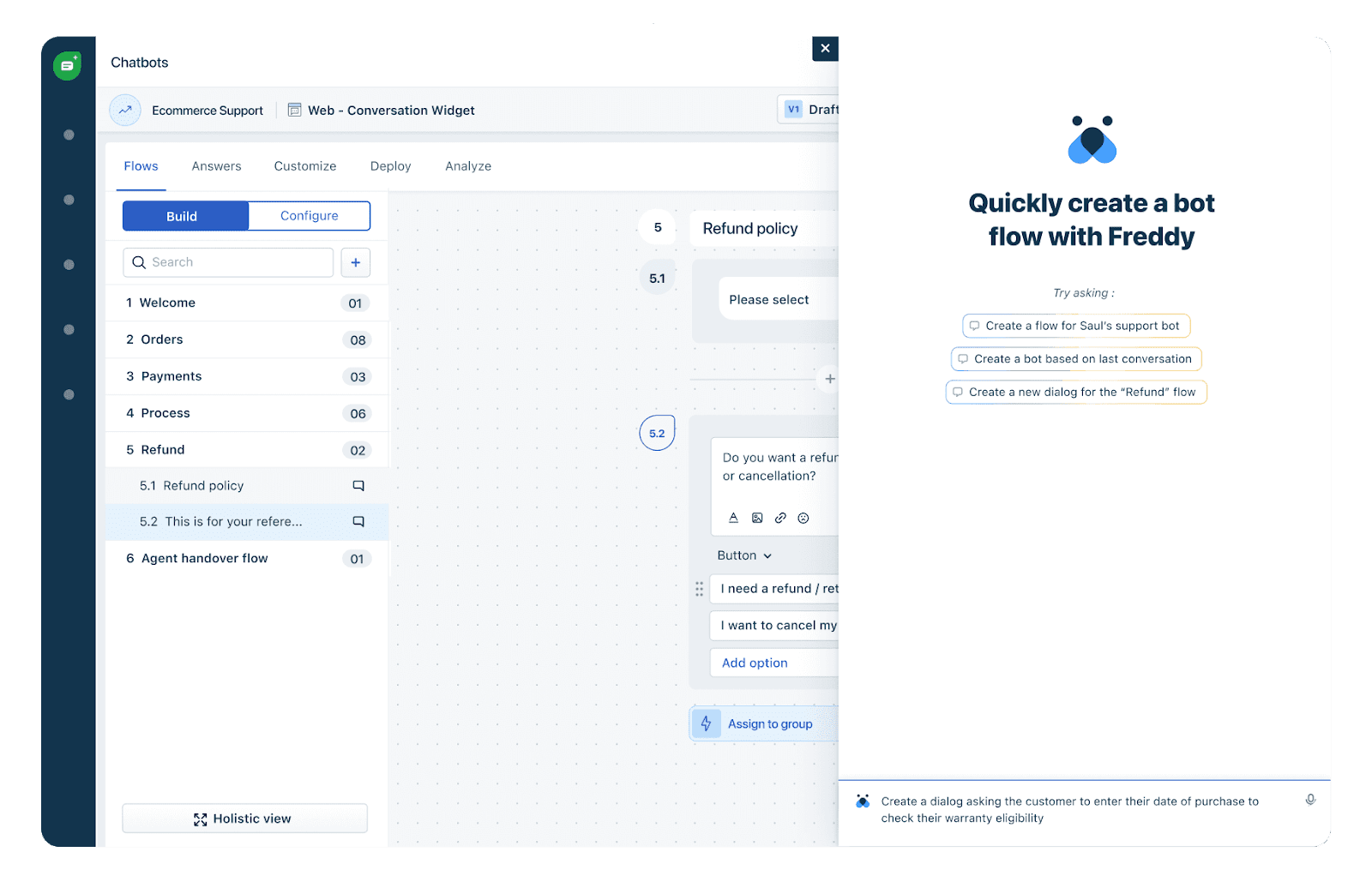
Image Source: Freshworks
Freshdesk also incorporates artificial intelligence (AI) and chatbot capabilities that automate routine inquiries and allow customer service agents to handle more complex issues.
Moreover, Freshdesk provides a multi-channel communication management system and a self-service support portal.
The portal includes a knowledge base and FAQs for customers to solve their issues without direct help.
PROS#
- Clean, easy-to-use UI
- Simple automation and canned responses
- Real-time email updates and shared inbox management
- Task assignment without forwarding emails improves teamwork
CONS#
- Limited font customization
- Font size issues across screens
- Difficult search for sent items
- Pricing may not suit smaller businesses
Freshdesk Pricing Plans#
Freshdesk offers a free plan with up to 10 agents at no cost, which is suitable for small startups.
The Growth plan is $18 per agent per month, which is ideal for expanding businesses.
For advanced features, the Pro plan costs $59 per agent per month, and the Enterprise plan provides extensive support tools for large organizations at $95 per agent per month.
3. Help Scout#
Help Scout is a user-friendly, HIPAA-compliant help desk focused on email support. It features a shared inbox that allows the customer support team to access and respond to customer emails.
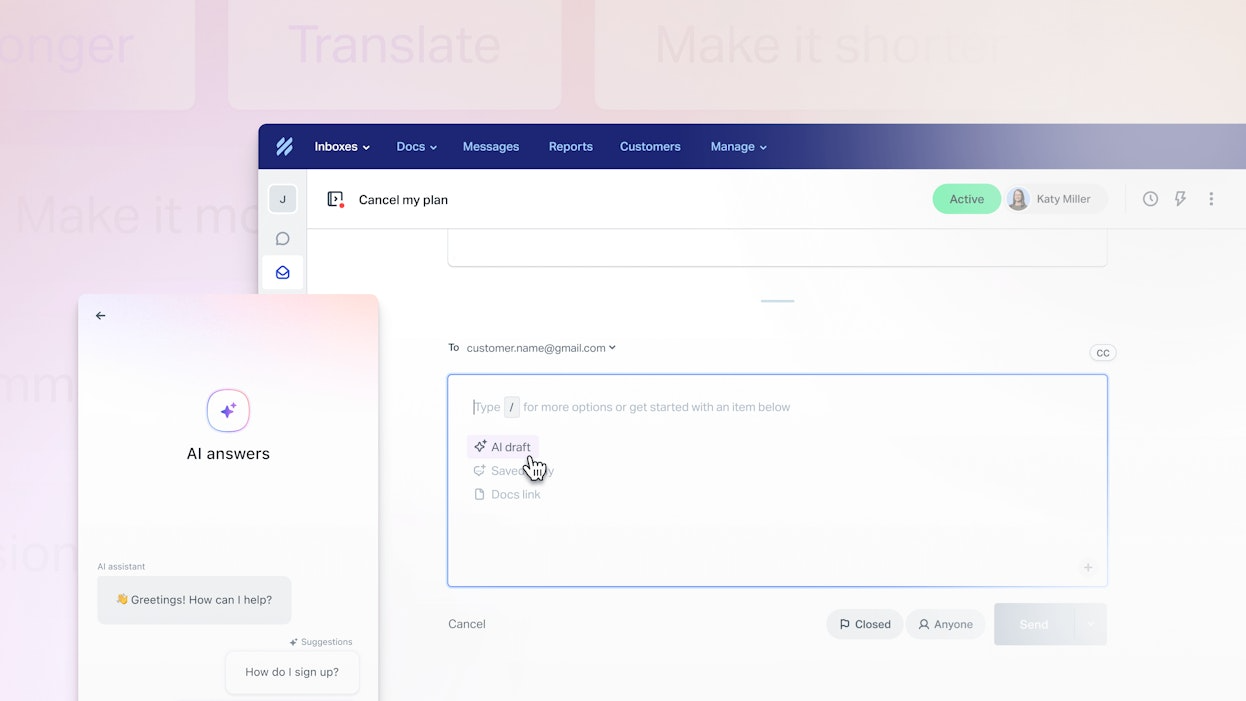
Image Source: Help Scout
The platform also includes a customer service CRM, which stores customer interaction histories and details.
The platform's Live Chat feature allows real-time customer communication directly on your website.
Additionally, it provides detailed help desk reporting tools that track important metrics such as response times and customer satisfaction.
PROS#
- Live chat speeds up client response time
- Great for managing and tracking content performance
- Simple workflows and task reassignment
- Detailed reports for each mailbox
- API supports custom integrations
CONS#
- No CSV downloads after filtering by tags
- CRM integration needs improvement
- Saved replies strip images, adding extra steps to the process
Help Scout Pricing Plans#
Help Scout offers a Standard plan for $25 per user per month, suitable for small teams needing basic multi-channel support.
The Plus plan at $50 per user per month provides advanced tools for growing teams.
For large organizations, the Pro plan costs $65 per user annually and focuses on security, scalability, and personalized service.
4. Salesforce Service Cloud#
Salesforce Service Cloud is a CRM platform enabling users to deliver improved service and support to their business customers.
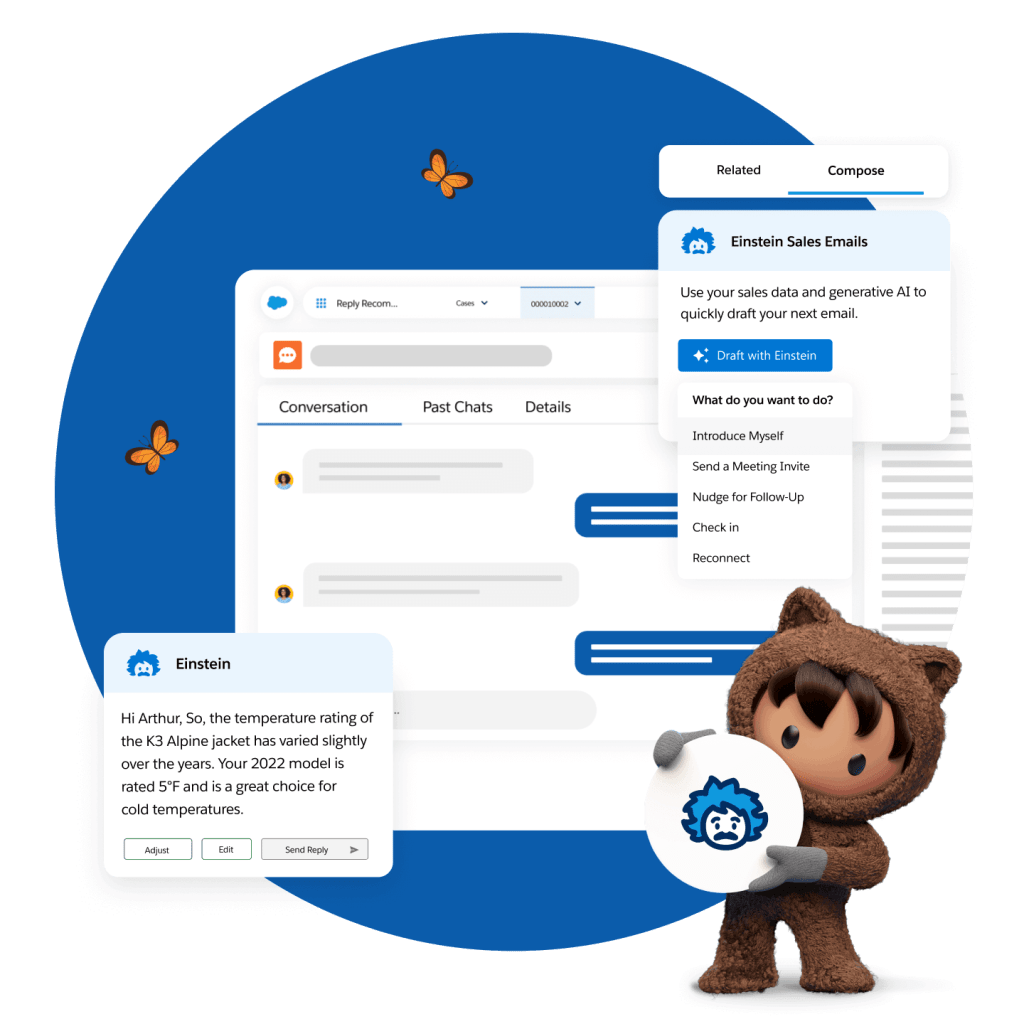
Image Source: Salesforce
This help desk software features the Lightning Service Console, a customizable dashboard that helps customer support teams manage customer requests across different channels.
Using drag-and-drop options, it automates routine processes with artificial intelligence for tasks like approvals and workflows.
Service Cloud also directs customer cases and questions to the best-suited agent based on their skills and current workload.
It integrates with social media to quickly handle queries on platforms like Facebook or Twitter. Then, it connects with phone systems to improve the management of customer calls.
PROS#
- Easy-to-read large font and simple navigation
- User-friendly UI for sales teams
- Customizable reports and workflows
- Efficient customer interaction tracking
CONS#
- API call limits can be restrictive
- Limited customization for reports and dashboards
- Folder sharing and individual dashboard sharing need improvement
Salesforce Service Cloud Pricing Plans#
Salesforce Service Cloud offers a $25 Starter plan for basic service needs. The $80 Service Professional plan offers comprehensive CRM for any team size.
The Enterprise plan, at $165, provides extensive customization for larger operations. Their unlimited plan, at $330, includes all advanced features and top-level support.
5. Intercom#
Intercom uses advanced AI to transform customer service for faster & effective customer support.
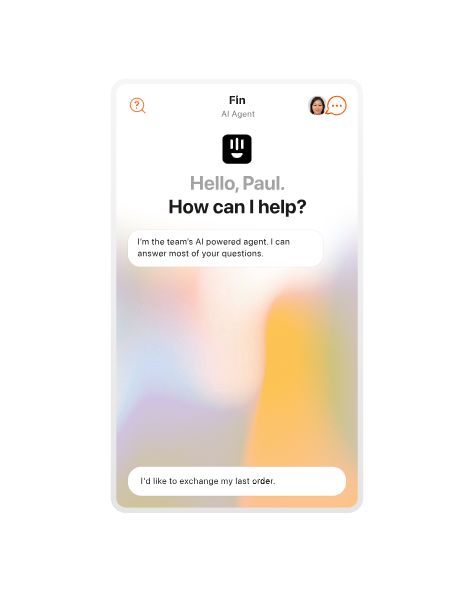
Image Source: Intercom
The Fin AI Agent, a smart chatbot, provides precise answers to customer questions using the latest AI technology and draws from your existing support content.
This feature works across all communication channels, such as email, phone, and messaging.
The platform simplifies managing customer inquiries by routing all messages from different channels into one central inbox.
Intercom's Help Center allows customers to access support articles and help guides through any communication channel.
For support agents, Intercom includes the Fin AI Copilot, which helps by generating high-quality answers to provide fast and accurate responses.
The AI-powered inbox helps teams work with a specialized ticketing system to prevent losing important information or context.
PROS#
- Adaptable processes for specific use cases
- Easy query assignment and tracking
- Customizable with external app integration
- Separates customer and internal tickets
CONS#
- Only shows a preview of segments
- Hard to search ticket attributes
- Limited control over conditional fields in tickets
Intercom Pricing Plans#
Intercom offers an Essential plan that costs $39 per seat monthly. This plan is ideal for individuals, startups, and small businesses that need basic customer support tools.
The Advanced plan, for $99 per seat per month, adds automation and AI features suitable for growing support teams.
The Expert plan, at $139 per seat per month, is designed for large teams that require advanced collaboration, security, and reporting tools.
LiveAgent#
LiveAgent is a cloud-based Help Desk solution with various features that help achieve customer service efficiency.
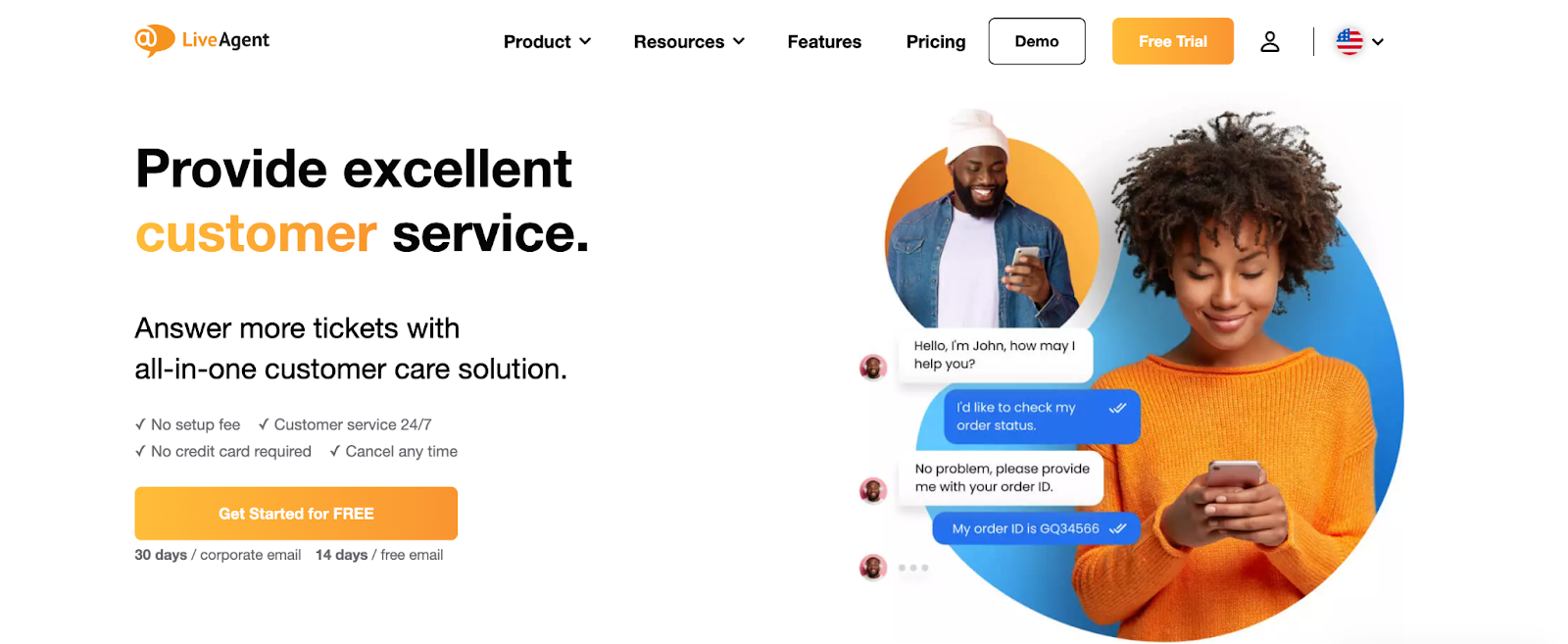
Image Source: LiveAgent
Its ticketing system prevents multiple agents from responding to the same query through Agent collision detection.
It can also simplify ticket handling with automated distribution and pre-written responses known as Macros.
The platform also offers live chat capabilities with customizable chat buttons and internal messaging for team communication.
It also provides proactive chat invitations to engage visitors and tools to track website visitor behavior for more personalized support.
LiveAgent integrates with major social media platforms like Facebook, Instagram, Twitter, and Viber to provide a unified approach to customer service across various communication mediums.
PROS#
- Quick setup for service robot
- Centralized management of multiple communication channels
- Helps boost sales through personalized customer interactions
- Provides internal notes in the ticketing system
CONS#
- The interface can be complex initially
- Lacks some WhatsApp Business API features like buttons
LiveAgent Pricing Plans#
LiveAgent offers a Small Business plan for $9 per agent, including advanced features with minimal limitations.
For mid-sized operations, the Medium Business plan costs $29 per agent with a well-rounded set of tools for comprehensive customer support.
The Large Business plan, at $49 per agent, includes many features for large-scale operations.
The Enterprise plan, at $69 per agent, caters to enterprise-level needs with extra support and exclusive services.
7. Zoho Desk#
Zoho Desk is equipped with a set of features that simplify customer support management.
The omnichannel support ticketing system is central to its offerings, allowing customer queries from various channels.
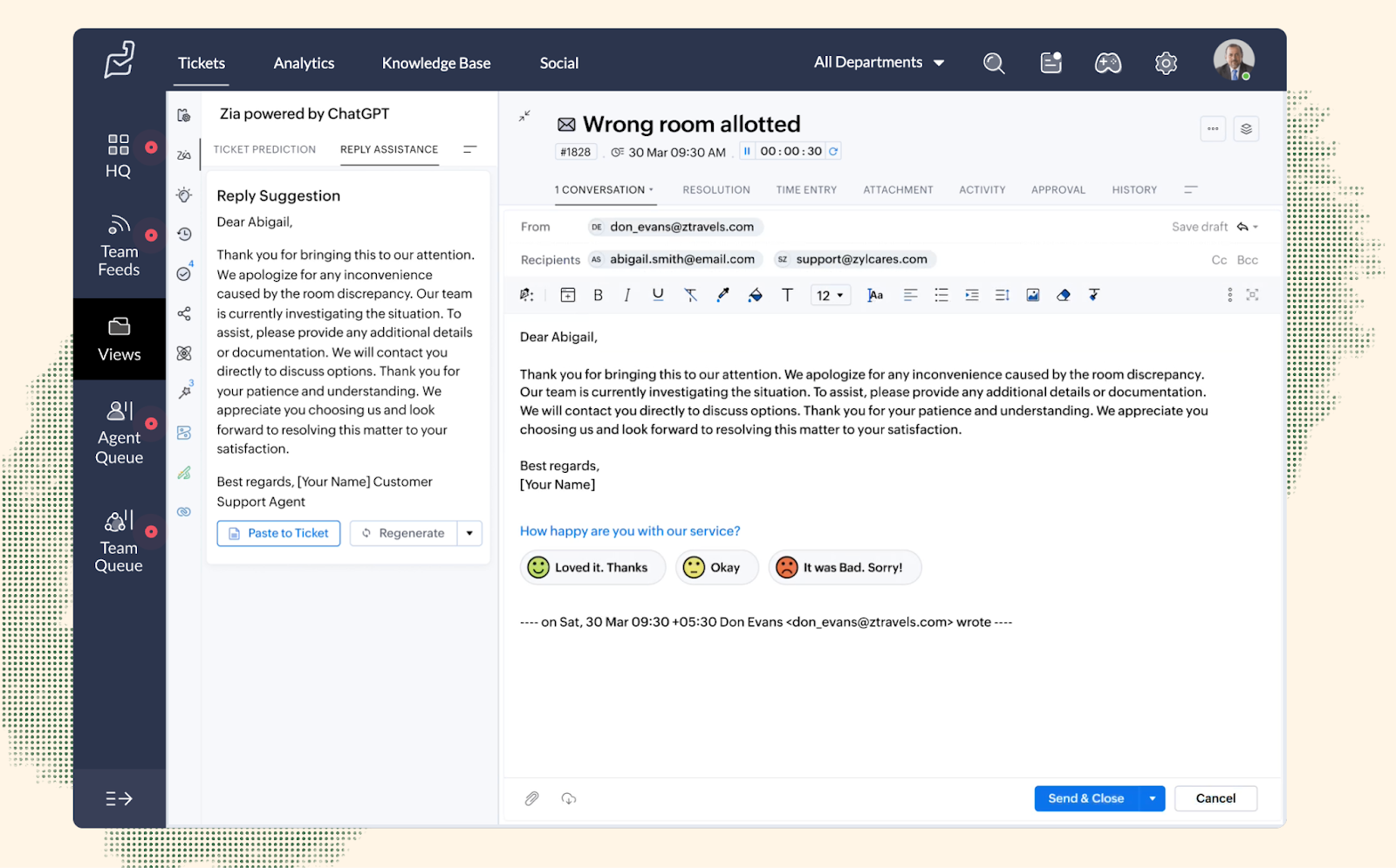
Image Source: Zoho Desk
It incorporates Zia, Zoho's AI-powered assistant, that provides contextual insights and suggestions across all support efforts.
This customer relationship management tool also facilitates real-time, conversational customer interactions with its Guided Conversations feature and automates repetitive tasks.
This customer service software also offers a variety of add-ons and integrations, which allow businesses to customize and extend their help desk capabilities.
PROS#
- Easy to use, affordable, and feature-rich
- Simple ticket submission
- Great multi-service and customer management tools
- Easy hour tracking for reports
CONS#
- The interface can be confusing for some tasks
- The ecosystem can feel complex
- Chat and CRM integration needs improvement
Zoho Desk Pricing Plans#
Zoho Desk offers a Standard plan at $20 per user per month, which includes essential features for small teams.
The Professional plan, at $35 per user per month, adds advanced collaboration and automation tools for growing teams.
For large organizations, the Enterprise plan at $50 per user per month provides advanced AI and extensive customization options for enterprise-grade support.
8. SolarWinds Service Desk#
SolarWinds Service Desk is designed to improve IT service management with several advanced features.
It uses an omnichannel IT ticketing solution that addresses issues across various communication channels.
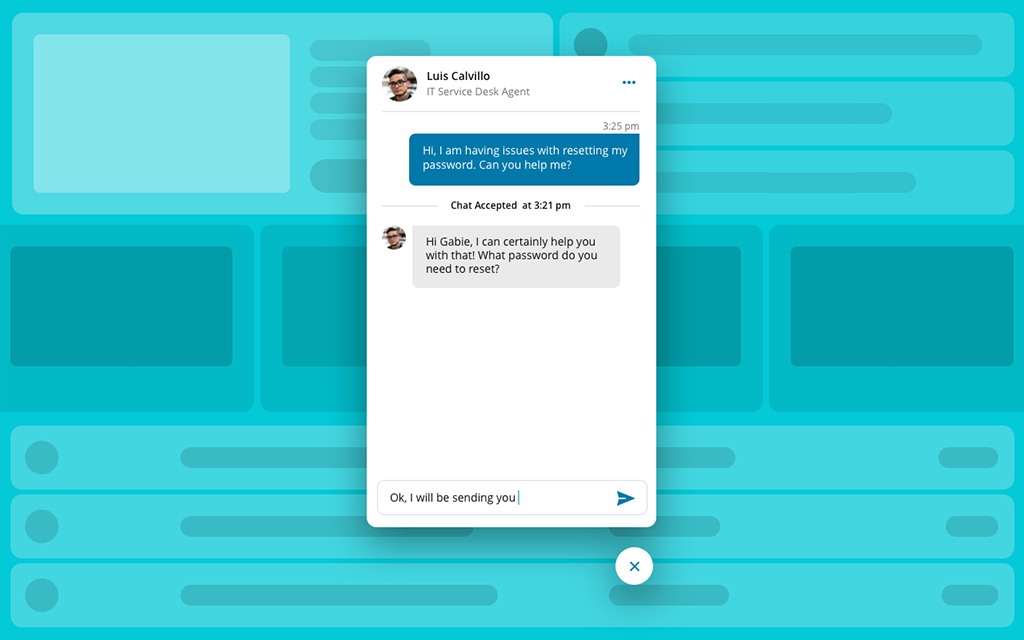
Image Source: SolarWinds
The Service Desk Chat feature, which uses virtual and live agents, speeds up the resolution time by providing immediate responses.
The platform incorporates AI technology that assists agents by suggesting the most effective resolution step.
SolarWinds automates the distribution of tickets to appropriate teams through set rules. It also offers an AI-powered knowledge base that supports both agents and users.
PROS#
- Easy for users and admins, integrates with domain control
- Excellent technical and customer support
- Custom ticket creation and processes
- User-friendly with strong automation options
CONS#
- Slow feature implementation
- Service request workflow lacks flexibility
- No custom form creation option
SolarWinds Pricing Plans#
SolarWinds provides an Essentials plan, priced at $39, for growing teams looking for basic IT service management tools.
The Advanced plan, priced at $79, is designed for mature IT organizations needing more complex capabilities.
The Premier plan, priced at $99, offers full customizability for large enterprises with specific requirements.
9. Gorgias#
Gorgias features an omnichannel approach so businesses can communicate with customers wherever they prefer.
The platform supports a range of communication methods, including email, live chat, social media (Facebook and Instagram), and WhatsApp.
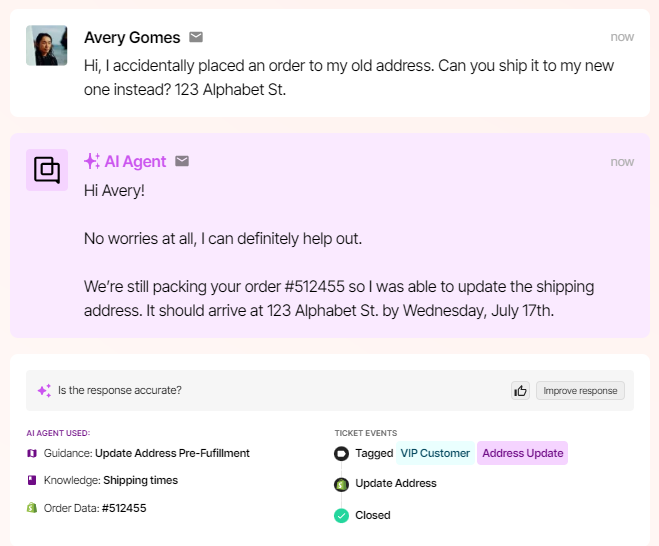
Image Source: Gorgias
It also features a shared inbox that simplifies request management. It uses tools like macros for quick responses to frequent questions, ticket assignments, and organizational tags.
Customizable ticket views allow teams to concentrate on specific groups of requests. Gorgias also includes CRM capabilities, such as a customer sidebar that gives agents useful context.
Gorgias provides an add-on package that includes autoresponders, article recommendations, and custom flows to automatically manage customer interactions.
It also integrates with major e-commerce platforms like Shopify, Magento, and BigCommerce.
PROS#
- Tracks daily work stats for team members
- Good interface and integrations
- Simple macro responses
- Easy customer service setup and team performance monitoring
CONS#
- Delays in workload updates
- Rules don't always trigger correctly and are hard to create
Gorgias Pricing Plans#
Gorgias offers its customer service platform as a monthly or annual subscription, with pricing based on the number of tickets and integrations.
Subscribing to yearly grants offers a discount equivalent to two months free.
Customers can choose the basic helpdesk service or upgrade to include additional features, allowing for customization based on business needs and scale.
10. Groove#
Groove provides a comprehensive set of tools tailored to improve the quality of customer interactions. The platform provides a shared inbox feature that centralizes all customer support communications.
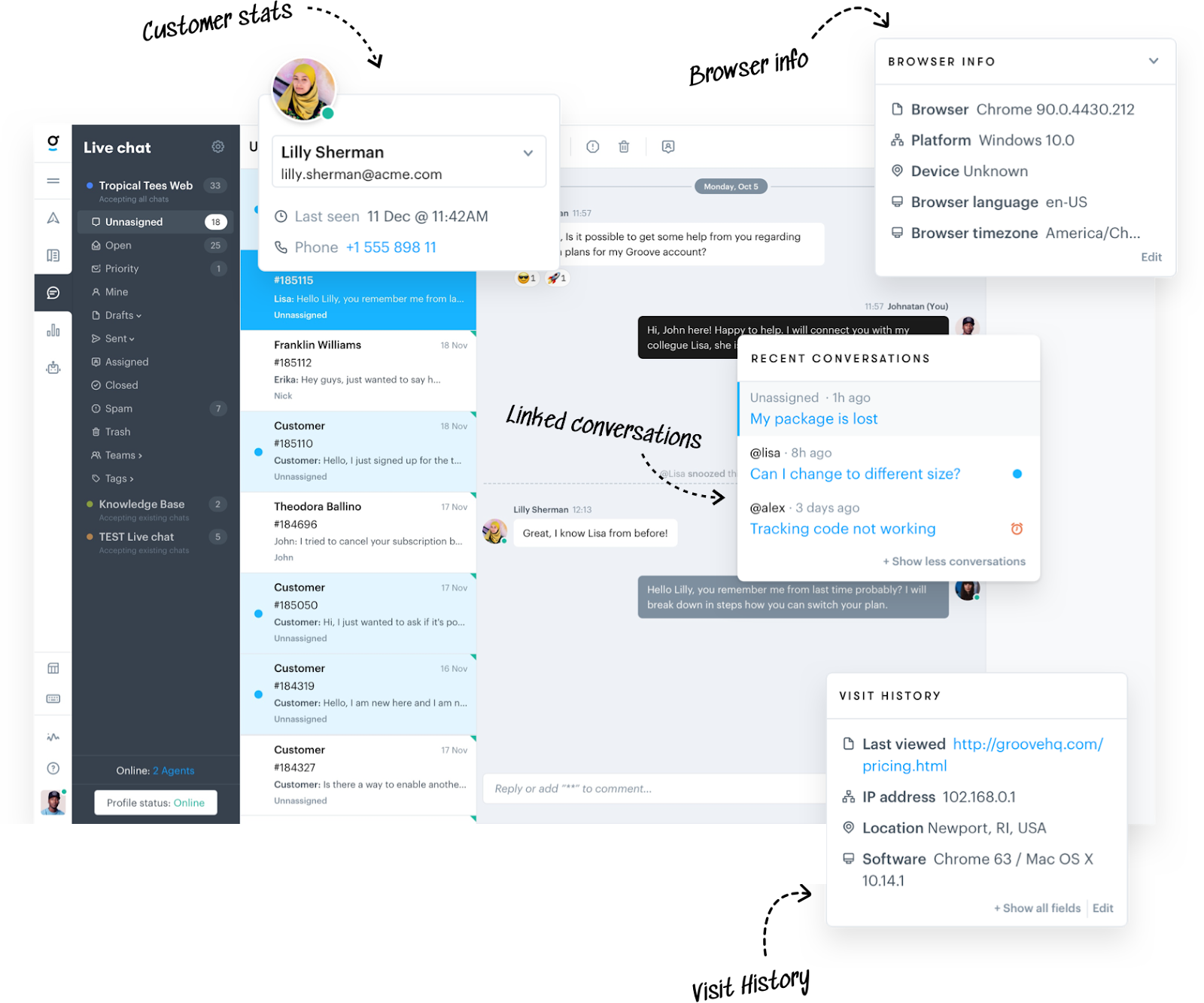
Image Source: Groove
Their Self-Service Knowledge Base allows customers to find answers on their own. This resource helps reduce the volume of incoming queries and boost customer satisfaction.
It offers integrations with popular tools like Slack, Stripe, Shopify, and Recharge.
Groove also includes Live Chat capabilities to create real-time conversations with customers.
For performance monitoring and service improvement, the platform also provides easy-to-understand reports focusing on key customer satisfaction metrics.
PROS#
- Easy inbox sharing and tagging
- Manage multiple inboxes in one place
- Read confirmations and internal notes
- Shared mailbox access for key tickets
CONS#
- Cannot reply to earlier threads
- No contact book and forwarding emails are difficult
- Time-consuming initial setup and customization
Groove Pricing Plans#
Groove offers a monthly standard plan for $20 per user, which is ideal for smaller teams or startups.
The Plus plan, at $45 per user per month, provides additional features for larger or growing teams.
The Pro plan is $70 per user per month and includes all features catering to large organizations.
Final Thoughts on Choosing Zendesk Alternatives#
When considering alternatives to Zendesk for your website, you must evaluate a few final considerations to ensure you make the best choice for your business.
Look for a solution that matches Zendesk's functionality and offers additional benefits that could further improve your customer support operations.
Denser.ai is a strong Zendesk alternative with superior AI automation capabilities and easy integration.
Its ability to deliver real-time, AI-powered responses impacts customer interactions far above what typical support platforms offer.
Denser.ai turns your website into a user-friendly space. Its simple chat interface helps visitors easily find what they need and adds a personal touch.
It doesn't just respond with pre-set answers; it interacts in a conversational way that makes each visitor feel like they're having a real discussion.
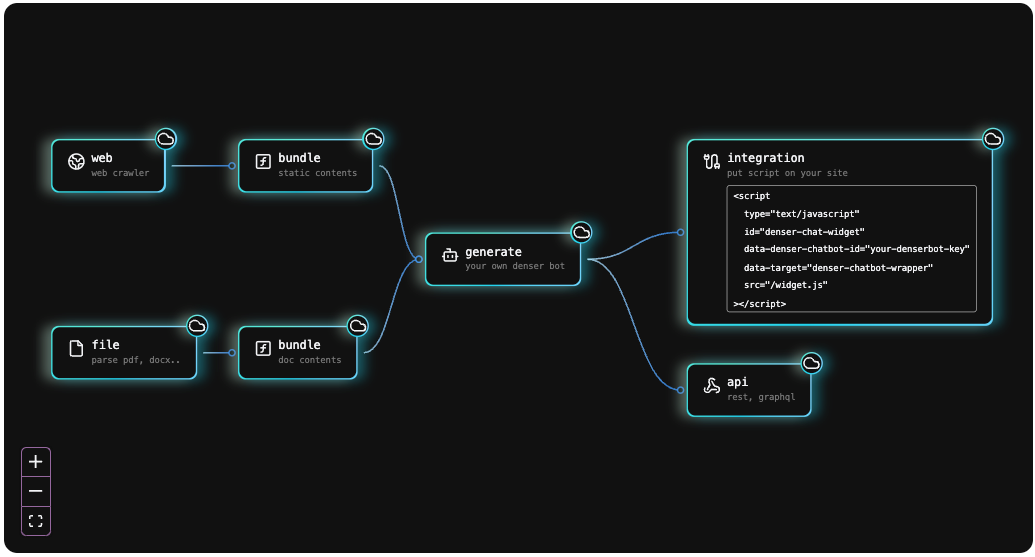
Moreover, you don't need to be tech-savvy to integrate this platform into your website. This allows you to enhance your site's functionality quickly and easily without any hassle.
This simplicity is a huge advantage over Zendesk, which can sometimes be overwhelming and complex due to its extensive process.
Setting Up Denser.ai on Your Website#
If you're considering a switch from Zendesk to boost your website with chatbot capabilities, integrating Denser.ai is a quick and simple process.
Here's how to add Denser.ai's chatbot to your site and use its features through REST requests.
Embedding the Chatbot Widget#
- Find the embed code: Denser.ai provides a short snippet of code you'll need to add to your website's HTML.

- Customize with your chatbot ID: The code snippet includes a placeholder for a chatbot ID. You'll replace this placeholder with the chatbot ID that Denser.ai provides you. This links the chatbot on your site directly to your Denser.ai account.
- Place the code on your site: Decide where you want the chatbot to show up on your website. Most people put it in the bottom right corner. Paste the code into the HTML at the location you've chosen. This will make the chatbot available for visitors anywhere on your site.
Using REST Requests with Your Chatbot#
- Set Up the REST Request: Denser.ai lets you send and receive messages to and from your chatbot using RESTful requests. This means you can program your chatbot to handle complex interactions.

- Adjust the Curl Command: Denser.ai provides a curl command, which is a way to send web requests. You'll need to edit this command by swapping out a placeholder chatbot ID with your actual chatbot ID.
- Connect It to Your Website's Backend: Add this curl command to your backend system. This is helpful for more complex tasks or for processing information related to your chatbot conversations.
Experience Smarter, More Efficient Support with Denser.ai#
If you're looking for a support platform that offers more flexibility and better automation than Zendesk, it's time to switch to Denser.ai.
With Denser, you get powerful AI-driven tools that handle routine tasks, simplify workflows, and boost your team's productivity.
Denser also integrates smoothly with popular platforms like Slack, Zapier, and Google Drive, allowing your workflows to stay connected without manual effort.
Unlike other platforms, this customer service solution provides accurate, personalized customer service, all while helping businesses reduce operational costs by up to 80%. It's a smart, scalable solution for businesses of all sizes.
Don't settle for less. Switch to Denser.ai today and see how it can boost your customer support experience.

Explore Denser.ai now and start building better customer relationships!
FAQs About Zendesk Competitors#
How customizable are the workflows in Zendesk competitors?#
Zendesk competitors allow businesses to define and automate specific processes based on their operational needs. Customization options may include setting up automated triggers for ticket routing based on inquiry type, customer priority, or agent availability.
Advanced platforms also offer visual workflow editors, making designing complex processes easier without extensive technical knowledge.
How do Zendesk competitors address software updates and downtime?#
Software updates are essential for maintaining any customer support platform's security, efficiency, and functionality. Zendesk competitors typically manage updates through scheduled maintenance periods to minimize disruption.
Customers are usually notified in advance about planned downtime, and these updates are often performed during off-peak hours to lessen the impact on business operations.
How does HubSpot Service Hub compare to Zendesk for customer support?#
Unlike Zendesk, which primarily focuses on customer service as a standalone feature, HubSpot Service Hub is integrated within a broader CRM system for seamless connectivity between marketing, sales, and customer service.